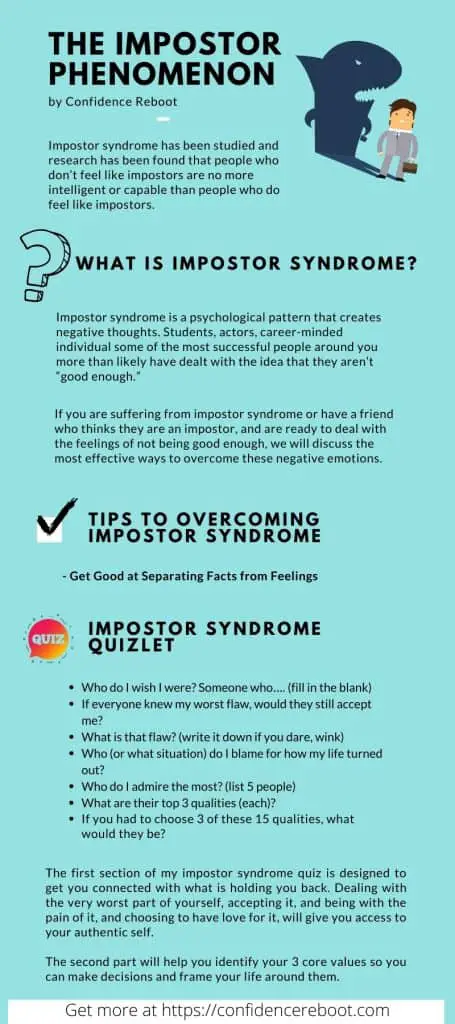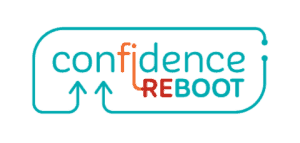
Impostor syndrome has been studied and research has been found that people who don’t feel like impostors are no more intelligent or capable than people who do.
The following facts may help you combat the feelings that surface with impostor syndrome.
- The syndrome is especially prevalent in our work lives, and the syndrome is especially common in people who are high-achievers, performers, and academics.
- It’s normal. Virtually everyone has felt like an impostor at one point in their lives.
- Maybe you feel isolated. Understanding that it is a common feeling and experience, may give you some distance between your experience and reality.
If you are experiencing imposter syndrome, how can you overcome the phenomenon? Recognize it for what it is: “just a feeling.” Separate fact from feelings. Look for the source of feelings of insecurity and inadequacy. Acknowledge that you are overly concerned with perfectionism. Work on self-doubt, and work towards self-love and acceptance.
If you are suffering from impostor syndrome or have a friend who thinks they are an imposter, and are ready to deal with the feelings of not being good enough, we will discuss the most effective ways to overcome these negative emotions.
The subject of this article is to give you mental judo to help you overcome the problem.
Let’s look at what psychologists and science has to say about the topic.

Let’s go over effective steps that have helped other people with impostor issues.
- Accept that it is normal to experience the impostor phenomenon.
- The key to overcome impostor syndrome is to separate fact from feeling effectively.
- Accept that feeling like you are an impostor or are not good enough is inherently human.
- Don’t let lack of achievements or failed attempts cause self doubt.
- An effective way to to deal with impostor syndrome is through self-love, positive affirmations, prayer, and choosing to act in the face of fear.
The feelings of being an impostor are far too normal to let it stop you.
Your job in life is to do the thing that is in front of you to do, and that’s it.
It’s important to point out that impostor feelings are often rooted in fear.
The problem is that people suffer in silence.
No matter what your expectations are, non impostors don’t exactly have the mental health world figured out. Ask any therapist.
Graduate school students may think that everyone else knows more than they.
At work, whether people are starting a new job or have been there for a long time, at times, anyone can experience things that make them wonder if they are impostors.
It’s not the new job, or the school. Anyone looking for success, can have things happen that make them believe their part isn’t good enough.
Self-confidence is lacking and the fear of being found out is all too prevalent. I wrote an article on being confident at work when you feel anxious.
It’s not just your personality. In fact, most personality types can wrestle with this.
It’s not just minority groups, it can be anyone who is chasing achievements and successes.
People with impostor syndrome that have found relief to the impostor phenomenon have cited taking action in the face of their fears as a key ingredient in their success.

Table of Contents
Impostor Syndrome At Work
For instance, a friend of mine is a doctor at a local hospital. He told me that he started out talking to patients as an intern with no idea of what he was doing.
He said he felt like he was just pretended to be a doctor. It was easy to feel like an impostor.
He said this continued for a long time until one day he was a doctor.
The experience was like pretending he was a doctor until one day he was.
He had a perception of what being a doctor is and what it feels like to be a doctor.
The truth was that as a “real” doctor, he didn’t feel much different on the inside.
If you are struggling with impostor syndrome, keep reading. You are not alone. I feel like an impostor too.
Let’s go deeper into some tips that have helped me overcome the feeling of being a fraud.
In fact, I’ve struggled with self-doubt most of my life. The self-deprecating voice really never goes away.
It’s right here, right now, as I write this in hopes of helping you move ahead in life.
The voice in my head that tells me things like:
- Who do you think you are?
- What gives you the right to think you can tell people how to shake the feeling of being an impostor.
- What if you don’t know how they really feel?
- You don’t have a PhD in Psychology.
- You aren’t the expert on impostor syndrome.
Now I recognize the feelings and thoughts for what they are. The feelings are rooted in the insecurity of not getting it right, not being liked, not being loved.
Impostor syndrome is real, and it doesn’t have to take you out.

What Is Impostor Syndrome?
Impostor syndrome is a psychological pattern that creates negative thoughts.
Students, actors, career-minded individual some of the most successful people around you more than likely have dealt with the idea that they aren’t “good enough.”
There also can be a nagging suspicion that you will be found out.
You may feel you could be exposed as not having the skills needed to be the person that you claim to be.
It shows up in your self-talk, the almighty internal dialogue.
Did you know that often experts think they have less skills than someone starting out?
It doesn’t matter what you accomplishments are, no one is exempt.
So, if you are expecting that more accomplishments is the way to finally get over the phenomenon, guess again.

How Can You Conquer Feeling Like A Fraud And The Effects Of Impostor Syndrome?
Tips To Overcoming Impostor Syndrome
This Overcoming Impostor Syndrome tip is undoubtedly one of the most powerful ways to cope with impostor-like thoughts when I feel like a fraud.
I had a therapist tell me that I had to learn to separate fact from feeling.
Get Good At Separating Facts From Feelings
In other words just because you FEEL like a fraud doesn’t mean you are a fraud.
I actively tell myself that just because an aspect of my life that feels real doesn’t mean it is.
It may simply be my interpretation. In one of the psychological/personal development courses I took, they said that “being right” is like a drug for us.
As humans we are so addicted to being right and feeling right, that we almost can’t help but believe ourselves when we think something is true.
Further, there is something called confirmation bias. It’s when we feel or believe something is true, we will look for reasons to justify why it IS true.
So, since I’m aware that the thoughts of being an impostor will creep up on me unexpectedly, I’m in the habit of telling myself that just because I’m feeling this right now doesn’t mean it is true (even though it appears really, really true.)
I’ll sometimes whisper this under my breath. It snaps me to being “present.”
I become aware that I’m think I’m not authentic and I’m aware that I am aware.
I like to picture myself standing outside of myself noticing the “person” (myself) that is having thoughts of not being adequate.
I remind myself of my friend who said he thoughts that he was just pretending to be a doctor until he was one.
Likewise, recognizing that the syndrome is a real thing and felt by many, may help you understand you aren’t alone.
The second thing that you will want to get clear on is why you have a need to “look good” and look like you have everything figured out.
While this is universal, ask yourself, are you trying to hide deeper insecurities that you are afraid others might notice?

Impostor Syndrome Quizlet
Here is an impostor syndrome checklist of what you might consider.
Grab a piece of paper and answer these questions:
- Do I often downplay my own accomplishments?
- Do I feel like I don’t really belong in my current position?
- Do I feel like I’m “faking it” when talking to colleagues or presenting in meetings?
- Do I worry that others will eventually find out that I’m not as competent as they think?
- Am I afraid of being found out as a fraud?
- Do I think I don’t deserve the successes I’ve achieved?
I urge you to really take the time to write down the answers to these questions.
Understanding The First Section of the Quiz
The first section of my impostor syndrome quiz is designed to get you connected with what is holding you back.
Dealing with the very worst part of yourself, accepting it, and being with the pain of it, and choosing to have love for it, will give you access to your authentic self.
Recognizing the situations that shaped you on a profound level will give you insight into discovering how you behave in the world.
For instance, when I was a kid, I grew up being cared for by a woman named Miss Peggy.
I was probably 4 or 5 years old at the time when the situation that I am about to share with you happened.
One of the kids that stayed with us on occasion, broke what we would consider an old-fashioned chair that had an articulating arm.
As I tried to help him repair the chair, an adult walked in.
Do you know what happened next?
Yes, you probably guessed it.
He blamed me. He said I broke the chair.
As I stood their holding the broken piece in my hands, it quickly became impossible to prove my innocence.
As I’ve become more self-aware (read another article I wrote our inherent lack of self-awareness that I wrote), I realize that I seemed to have a deep need to explain myself, and to avoid the sense that I’m misunderstood.
Here is an article I wrote on why we hate talking to ourselves -Is it normal?.
It became annoying to my friends to hear me explain everything, always trying to protect my innocence.
Further, I talked too much. But, it was all to hide the insecurity.
It takes so much courage to be with the fact that we can’t be perfect and to accept ourselves for who we are.
Often that is why others appear more confident in their careers etc.
Incidentally the opposite of impostor syndrome is the dunning-kruger effect where people massively overestimate their abilities.
Thanks for spending this time with me here. I wish you all the best in your successes.
Here’s an article I wrote on: You 2.0 (How to become the best version of yourself.) You might find it interesting.
